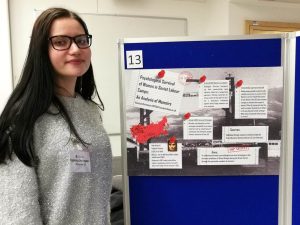The first question I get asked when I tell people my dissertation is on women’s psychological survival in Soviet labour camps is often ‘Isn’t that depressing?’, or ‘Why did you pick that?’. These are not absurd questions, since the answer to the first question is yes (but so what?), and the answer to the second question is something I still haven’t quite figured out myself.
I wanted a topic from Russian history, which would allow me to look closely into people’s lives, and which would be suitable to a multidisciplinary approach. My degree is History with English Literature, so I was looking for something where I could utilise the skills I acquired from both History and English Lit counterparts in my investigation. Psychological survival of women in Soviet labour camps offered just that, as the majority of my sources are memoirs, which are literary by nature and require an analysis of language, tone, and style, as well as historical context.
In my dissertation I draw on a variety of academic works from diverse spheres, including history, psychology, literature, and sociology. At times, working with unfamiliar academic studies and practices has been a challenge, since I have never studied psychology or sociology – but if my dissertation experience taught me anything, it is the existence of transferable skills of analysis and evaluation within any humanities subject, which can be extended even into the social sciences.
Most of my memoir source material is in Russian; this has not been an issue for me since I am a fluent Russian speaker, although acquiring access to such sources was in itself an adventure. The biggest archive of Soviet labour camp memoirs is in Moscow, housed by the Memorial Society which works to raise awareness of Gulag victims and their testimonies. I visited Moscow in the summer, and contacted the society, who were happy to provide me with access to their extensive and invaluable memoir and museum collection. This was a short visit, but I was able to get my hands on some unpublished sources in their original state – one of the memoirs was a handwritten account, exciting for any historian! I also visited the Gulag Museum, which contained authentic material from Soviet prisons and camps. Getting to see such material up close was motivating and humbling – I found real purpose behind my dissertation and began to consider it as a way of making forgotten voices heard, but I was also reminded that I was writing about real people and real suffering, something which often gets side-lined when you are simply reading words on a page.

My dissertation journey has been an incredibly rewarding experience, although it definitely hasn’t all been fun and adventure. There’s a lot of hard work that goes into the research, the analysis, and the writing, so I would advise students to pick a topic that can sustain your interest for nearly two years and hours of independent work. I am really glad to have picked a topic from Russian history, as this has given me the chance to use my language skills and to reconnect with my own heritage in unexpected ways. It has been refreshing to step away from European history and I would encourage everyone, irrespective of background, to give world history a go, be it through a module or even through a dissertation. Our society is becoming increasingly global, and now more than ever it is important to understand other histories and cultures around us. History never has, and never will, exist in a vacuum, after all.
